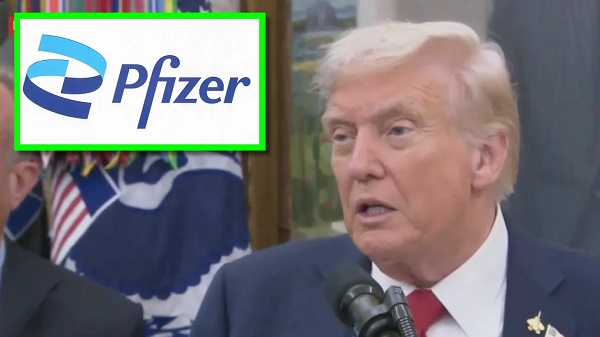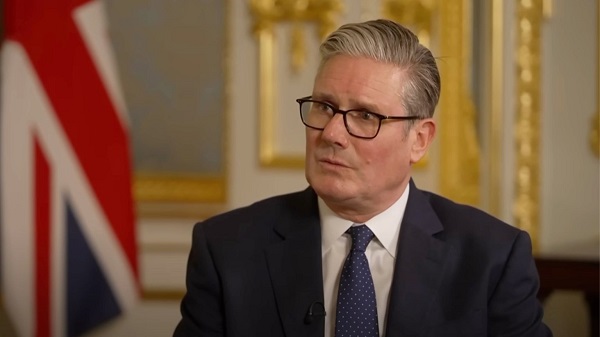Business
Pfizer Bows to Trump in ‘Historic’ Drug Price-Cutting Deal

Under the agreement, New York-based Pfizer will charge most-favored-nation pricing to Medicaid and guarantee that pricing on newly launched drugs, Trump said. That involves matching the lowest price offered in other developed nations.
In a landmark announcement, President Trump revealed a deal with Pfizer that slashes drug prices for Americans on Medicaid on a massive scale.
Under this agreement, Pfizer will offer its medications to Medicaid at “most favored nation’s prices.”
Under the agreement, New York-based Pfizer will charge most-favored-nation pricing to Medicaid and guarantee that pricing on newly launched drugs, Trump said. That involves matching the lowest price offered in other developed nations.
“It’s going to have a huge impact on bringing Medicaid costs down like nothing else,” the president said.
“I can’t tell you how big this is,” he added.
The conference opened with Trump telling Pfizer CEO to his face that he is “surprised” he is agreeing to massive price cuts to his company’s drugs.
Albert Bourla smiled and stood silently as Trump announced devastating news for his company’s profits in America.
RFK Jr. heaped praise on President Trump for several minutes after he struck a deal that other politicians said was impossible.
Kennedy called it something “Democrats have wanted for 20 years, Republicans have wanted for 20 years,” but said no president had ever been able to make it happen until Trump pushed drug companies to the table.
“All we could see was all the reasons this couldn’t happen. Everybody tried. Nobody could make it happen. And it was President Trump alone who, with his doggedness and persistence, saw this clearly in a way that none of us [did],” Kennedy said.
“I can’t think of any other president in the United States that could have done this in our history.”
Dr. Oz couldn’t hide how proud he is to work for the White House — calling it a “cool place to work” after Trump did the impossible in a “historic” deal that forced pharmaceutical giants to stop ripping Americans off on drug prices.
He said the team had been working “24/7 nonstop with industry, with Albert [Bourla], with his great team at Pfizer” to get them to sell prescription drugs to Medicaid at the lowest global rate.
“We’re going to finally deliver on the fair drug prices that President Trump has been speaking about for two terms. We’re going to celebrate this historic day. I predict this historic day [will have a positive impact] in the medical field for generations to come,” Dr. Oz declared.
When Pfizer CEO Albert Bourla got his chance to speak, he revealed that President Trump made four specific requests to lower drug prices in America — and Pfizer’s deal today meets ALL of them.
Bourla admitted America was in an “unfair situation” while “other rich nations refused to pay their fair share for the medical innovation.”
That’s changing. Under the new agreement, Medicaid sale prices will drop significantly. Meanwhile, other countries that have long paid rock-bottom prices will see modest increases.
The big winner in this deal, Bourla said, was “the American patient.”
“Who else is a winner here?” he asked. “It is American innovation and American economy.”
Trump suggested that the breakthrough on drug prices could also translate to lowering health insurance.
In terms of real-world results, Trump called it “massive.” He explained how a drug that sells for $137 in America will drop to just $15 to $18.
In other countries, the same drug is sold for only $10, and they will now have to raise the price slightly.
But America is no longer footing the bill, so the rest of the world can get cheap drugs. And finally — in a move once thought impossible — Americans on Medicaid will be paying a fair price.
Business
Ottawa’s civil service needs a Chrétien-style reset

This article supplied by Troy Media.
If Carney followed Chrétien’s lead, he could cut 64,000 jobs and save $10 billion a year
They say bureaucracy grows to meet the needs of the expanding bureaucracy. That certainly seems to be Ottawa’s motto these days, with the number of federal civil servants swelling by more than 100,000 over the past decade.
As the bureaucracy grew, so did the resources it devoured and the burden it dumped on the federal budget. If the Carney government is serious about tackling its spending problem, it has no choice but to shrink the civil service. To its credit, the government has already signalled this may be coming, with Finance Minister François-Philippe Champagne directing ministries earlier this month to cut program spending by 7.5 per cent in 2026-27, with deeper cuts to follow.
Payroll tells the story. When Justin Trudeau came to power in 2015, Ottawa was spending about $39.6 billion on employee compensation. Last year, that figure hit $71.1 billion—a staggering 79.5 per cent jump in nine years. Numbers that big are hard to picture, so here’s what they mean: $71.1 billion equals roughly $1,700 per Canadian, or about $7,000 for a family of four.
That’s a lot of money. Given those costs, Canadians are right to ask whether they’re getting anything close to value. The answer, judging by opinion surveys, is no.
Passport lines still snake around the block. Clearing customs at the airport remains a test of endurance. And if you dare call the Canada Revenue Agency, pack a lunch, you’ll be on hold long enough to need it. For all the extra spending, everyday frustrations remain the same.
If all that spending hasn’t delivered better results, it’s a flashing neon sign that resources are being wasted. The civil service is a prime candidate for cuts that could be made with little, if any, impact on the quality or speed of services Canadians actually receive.
The average compensation for a full-time federal job is now around $150,000 a year. That includes salary, taxpayer-funded pension contributions, and a generous menu of benefits. By contrast, the average Canadian earns about $60,000—the same taxpayer footing the bill— and the inequity speaks for itself.
The problem isn’t just the cost but the culture. In the private sector, businesses constantly ask whether jobs are necessary and whether people can be redeployed. In government, the tendency is to keep hiring, with little scrutiny of whether those positions are truly needed.
Yet there is precedent for Ottawa getting serious about reform. In the 1990s, Jean Chrétien’s government undertook a sweeping review that eliminated more than 17 per cent of federal positions.
If the Carney government followed that model, it could trim about 64,000 taxpayer-funded jobs and save at least $10 billion a year.
With Ottawa projected to run a deficit of over $40 billion this year, one of the largest structural deficits outside of the pandemic years, Canadians should expect—no, demand—an equally ambitious review.
Renaud Brossard is vice-president of communications at the Montreal Economic Institute, a think tank with offices in Montreal, Ottawa and Calgary.
Troy Media empowers Canadian community news outlets by providing independent, insightful analysis and commentary. Our mission is to support local media in helping Canadians stay informed and engaged by delivering reliable content that strengthens community connections and deepens understanding across the country.
Agriculture
Carney’s nation-building plan forgets food

This article supplied by Troy Media.
Canada’s agri-food sector powers $90 billion in exports and one in nine jobs, yet it’s missing from the fed’s flagship infrastructure agenda
Prime Minister Mark Carney’s “nation-building” strategy may boast big wins for energy and infrastructure, but it sidelines one of Canada’s greatest economic assets: food.
His first five flagship projects—the LNG terminal in Kitimat, a small modular nuclear reactor in Darlington, the $1-billion Contrecoeur container terminal east of Montreal and mineral developments in B.C. and Saskatchewan—send a message that Ottawa is ready to build. But for all their ambition, they overlook the sector that feeds the country, powers $90 billion in exports and supports one in nine jobs.
Canada is one of the world’s great breadbaskets—reliable, safe and absurdly productive. The agrifood sector isn’t just farms and tractors; it’s one of the most advanced, innovative ecosystems we’ve got. And yet, among Carney’s first round of “nation-building” moonshots, food didn’t even get a seat at the table.
Sure, the expanded port in Montreal will help grain and processed food shipments. And yes, stable nuclear power might one day shave energy bills for processors and greenhouse growers. But these are trickle-down perks—not the kind of direct investment the sector actually needs. Food deserves its own spotlight.
This oversight isn’t just symbolic—it exposes real pressure points that threaten the entire system. Take Western Canada’s beef-packing bottleneck, for example: a few mega-facilities dominate the sector, so when one gets gummed up by a strike or shutdown, it sends shockwaves through the entire supply chain. Farmers are left holding the bag—and consumers feel the hit. Expanding and decentralizing capacity would help, but that’s just scratching the surface.
If Carney wants to prove Canada can be a food power as much as an energy one, we need projects with the same heft and urgency as those just announced. To match the ambition of Carney’s energy and infrastructure plans, here are five food-sector nation-builders that would move the dial:
1. The Prairie Gateway Grain and Pulse Terminal—a rail-linked export hub in Saskatchewan or Manitoba—would get lentils, peas, canola and wheat to global
markets fast. Think Contrecoeur, but for the Prairies.
2. Protein Supercluster 2.0 would string together state-of-the-art processing facilities to transform raw commodities into premium plant proteins, canola oil and biofuels. A second-generation government-backed innovation corridor, it would help Canada move from raw exports to value-added, export-ready, job-creating production.
3. A National Plant and Animal Science Campus, inspired by Wageningen University in the Netherlands—a world leader in agricultural research—would centralize the kind of next-gen crop science, livestock genomics and climate-resilient breeding Canada will need to compete in the decades ahead. Call it moonshot science; we’ve been staring at the ground too long.
4. Northern Food Sovereignty Corridors, featuring investments in greenhouses, vertical farms and logistics, would reduce reliance on overpriced imports and bring fresh food, and economic independence, to northern and Indigenous communities. It would also move reconciliation from speech to action.
5. A Digital Food Traceability Network would use blockchain and AI to track food from seed to supper, slashing waste, boosting consumer confidence and giving our exports a transparency edge in an increasingly picky global market.
Carney’s five projects are a solid start. They prove Canada can think big. But a real strategy needs to feed people as well as power them. Agriculture can’t remain the forgotten cousin in economic planning.
The point isn’t to downplay the importance of energy or mining. Mines and reactors may fuel prosperity but it’s food—and the infrastructure, science and innovation behind it—that will secure it. Canada’s real strength lies not just under the ground but in the fields, labs and refrigerated supply chains that keep our plates full and our trading partners coming back for seconds.
Dr. Sylvain Charlebois is a Canadian professor and researcher in food distribution and policy. He is senior director of the Agri-Food Analytics Lab at Dalhousie University and co-host of The Food Professor Podcast. He is frequently cited in the media for his insights on food prices, agricultural trends, and the global food supply chain.
Troy Media empowers Canadian community news outlets by providing independent, insightful analysis and commentary. Our mission is to support local media in helping Canadians stay informed and engaged by delivering reliable content that strengthens community connections and deepens understanding across the country.
-

 Censorship Industrial Complex13 hours ago
Censorship Industrial Complex13 hours agoCanada To Revive Online Censorship Targeting “Harmful” Content, “Hate” Speech, and Deepfakes
-

 International2 days ago
International2 days agoWhat was the FBI up to on January 6?
-

 Censorship Industrial Complex2 days ago
Censorship Industrial Complex2 days agoDigital ID UK: Starmer’s Expanding Surveillance State
-

 International2 days ago
International2 days agoTrump authorizes “full force” to stop Antifa attacks in Portland
-

 International21 hours ago
International21 hours agoTrump, Netanyahu inch closer to peace plan for Gaza
-

 Health2 days ago
Health2 days agoThe Religious Faith in Vaccines has been Challenged, Forcing New Studies and More Rigorous Standards
-

 Artificial Intelligence2 days ago
Artificial Intelligence2 days agoThe App That Pays You to Give Away Your Voice
-

 Alberta16 hours ago
Alberta16 hours agoAlberta refuses to take part in Canadian government’s gun buyback program












